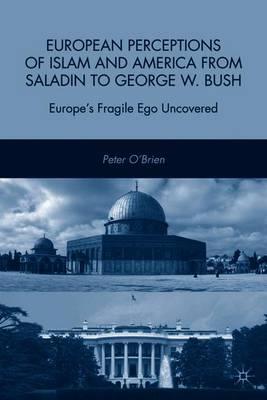Full Product Details
Author: P. O'Brien
Publisher: Palgrave Macmillan
Imprint: Palgrave Macmillan
Dimensions:
Width: 14.00cm
, Height: 1.70cm
, Length: 21.60cm
Weight: 0.460kg
ISBN: 9780230613058
ISBN 10: 0230613055
Pages: 230
Publication Date: 13 February 2009
Audience:
College/higher education
,
Professional and scholarly
,
Undergraduate
,
Postgraduate, Research & Scholarly
Format: Hardback
Publisher's Status: Active
Availability: Out of print, replaced by POD

We will order this item for you from a manufatured on demand supplier.
Reviews
<p> O'Brien has done a stunning amount of research and organized it attractively. This book should be both popular and informative. --Jacques Barzun, author of From Dawn to Decadence, 1500 to the Present: 500 Years of Western Cultural History <p> A sweeping, erudite, incisive, and pioneering interpretation of European identity formation which demonstrates the profound influence of Islamic civilization (not to mention America) on western Europe. Well written and researched, this book offers a unique challenge to Eurocentrism. --S. M. Ghazanfar, Professor/Chair (Emeritus, 2002) Economics at the University of Idaho<p> In this well-written and bold book Peter O'Brien has provided a major contribution to World- and European-history by refining our understanding of European identity as it unfolded in the last millennium. While Eurocentrism assumes that the West deemed itself to be superior to all other civilizations at least since 1500, as does non-Eurocentric revisionism for the post-1750 period, O'Brien argues that Europe has long been marked by a sense of insecurity and a fragile ego. The narrative is developed through a long-historical examination of Europe's perceptions principally of Islamic civilization as well as the United States. Though situated within the revisionist literature, nevertheless the book's excellent argument should provoke revisionist- as well as Eurocentric- scholars to rethink some of their most fundamental assumptions about Europe and the Rise of the West. -- Professor John M. Hobson, University of Sheffield, and author of The Eastern Origins of Western Civilization <p> In his vigorous, provocative history of European identity, Peter O'Brien has devised a genuinely new approach and achieved a startling insight: Eurocentrism - ostensibly so self-confident - started in minds intimidated by other, mightier civilizations. Europeans' current diffidence no longer looks like a new response to a dynamic world, but an age-old, essential ingredient of t
O'Brien has done a stunning amount of research and organized it attractively. This book should be both popular and informative. --Jacques Barzun, author of From Dawn to Decadence, 1500 to the Present: 500 Years of Western Cultural History <p> A sweeping, erudite, incisive, and pioneering interpretation of European identity formation which demonstrates the profound influence of Islamic civilization (not to mention America) on western Europe. Well written and researched, this book offers a unique challenge to Eurocentrism. --S. M. Ghazanfar, Professor/Chair (Emeritus, 2002) Economics at the University of Idaho<p> In this well-written and bold book Peter O'Brien has provided a major contribution to World- and European-history by refining our understanding of European identity as it unfolded in the last millennium. While Eurocentrism assumes that the West deemed itself to be superior to all other civilizations at least since 1500, as does non-Eurocentric revisionism for the post-1750 period, O'Brien argues that Europe has long been marked by a sense of insecurity and a fragile ego. The narrative is developed through a long-historical examination of Europe's perceptions principally of Islamic civilization as well as the United States. Though situated within the revisionist literature, nevertheless the book's excellent argument should provoke revisionist- as well as Eurocentric- scholars to rethink some of their most fundamental assumptions about Europe and the Rise of the West. -- Professor John M. Hobson, University of Sheffield, and author of The Eastern Origins of Western Civilization <p> In his vigorous, provocative history of European identity, Peter O'Brien has devised agenuinely new approach and achieved a startling insight: Eurocentrism - ostensibly so self-confident - started in minds intimidated by other, mightier civilizations. Europeans' current diffidence no longer looks like a new response to a dynamic world, but an age-old, essential ingredient of the idea of Europe. -- Felipe Fernandez-Armesto, William P. Reynolds Professor of History, University of Notre Dame
Author Information
PETER O'BRIEN is Professor of Political Science at Trinity University, USA.




